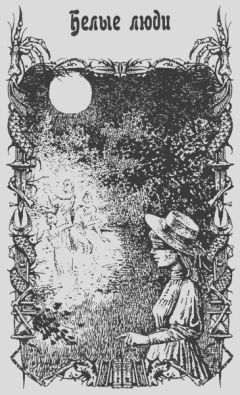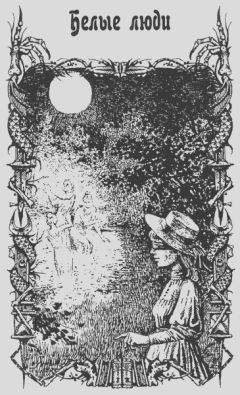Barbara Hambly - Dead water
Along the foot of the bluff, between the steep brown cliff of clay and the brown waters of the river, lay Natchez-Under-The-Hill.
“Whatever you do, stay on the boat.” From behind the corner of the 'tween-decks, January watched Mr. Weems fussing about the bow-deck, like an animate marigold in his mustard-colored frock-coat, as he supervised the raising of two trunks from the hold. “My guess is, they're off-loading part of the loot for storage here, to be picked up later when the search dies down. I think they'll be back.”
In the wide space of mud and gravel that lay between the water's edge and the first row of rickety warehouses and taverns at the foot of the bluff, a dozen drivers waited with carriages of various sorts, now and then hopping down from their boxes to bargain with passengers from the boats. Oliver Weems strode briskly across the landing-stage to the bank, signaled to one of the drivers. Just beyond him, a bearded white man dashed naked from one of the filthy alleyways, howling that he'd been robbed.
In the windows of a dozen ramshackle sheds, women of every shade from alabaster to ebony leaned out and shrieked with laughter; a man in a saloon doorway yelled, “Still got the family jewels, Bert?” The smell of the tangled criss-cross of streets under the summer heat was like the Swamp in New Orleans, and the feel of the place—of casual violence and uncaring vice—was, if anything, worse.
“Be in town awhile, Henry?” yelled a red-haired strumpet from a second-floor window, causing Mr. Tredgold to jump as if scalded; three other girls poked their heads through the same window and blew kisses.
Resplendent in his shabby coat and chimneypot hat, Hannibal paused on the landing-stage and stretched out a hand:
“But soft, what light through yonder window breaks?
It is the East, and Juliet is the sun. . . .”
“And if they don't return?” asked Rose softly as January stepped back into concealment at her side.
“We'll get you word.”
In the engine-room, the stokers were drawing the fires from the furnaces, or damping them with ashes, to keep a low level of steam seething in the boilers without running them dry. The engines were silent, the black monster of the paddlewheel still; in the relative quiet, the shrill screams of Miss Melissa and young Master Tredgold could be heard: “We want to get off the boat! Let us get off the boat! Mama said we could get off the boat, Cissy! We'll tell Papa to beat you unless you let us . . . !”
The denizens of Natchez-Under, January reflected, would chop those two children up for breakfast and serve them with grits.
Early as it was, the deck of the Silver Moon bustled with life. The planter Roberson handed his wife and daughters down the main stairway—as far as January had seen, the first time any of the Roberson females had descended to water-level since New Orleans—and conducted them across the landing-stage to where the brightly-polished black landaulet of family friends waited to take them visiting while the boat lay in port. The deck-passengers hastened ashore as well, the immigrant families to replenish their provisions from the town markets, the Sams and Kyles and their ilk to get drunk and laid and, January earnestly hoped, if possible, killed as well. Thucydides stood beside the hatch, tallying something in his notebook. Mrs. Tredgold screamed orders. Mr. Tredgold wrung his hands.
“Well, if you miss the boat,” said Rose, who always had a backup plan, “I'll leave you reports at General Delivery, left till called for, in Vicksburg, Mayersville, and Greenville, and I'll wait for you at the best free colored boardinghouse in Memphis. I'm not sure I'll be able to pursue our friends beyond Memphis alone. . . .”
“You're not going to have to pursue our friends anywhere,” insisted January, more to reassure himself than her. He pulled her into his arms, kissed her hard. The thought of Rose alone in a strange city—much less a hub of the slave trade like Memphis—made him shudder, even without the added complication of her trying to convince white American police that a respectable white banker was a thief. . . .
“I won't miss the boat.”
“Of course not,” agreed Rose far too promptly.
Why do I dream about rescuing this woman? If she ever dreamed about anything more disturbing than conjugating Latin verbs, she'd dream about rescuing ME.
“There,” said January softly. “Only one valise. They'll be back.”
Mrs. Fischer descended the stair, paused to gaze down her nose at Ned Gleet as he thrust and drove his slave-gang ashore, then swept to the landing-stage, where Weems waited by the cab. Sophie followed meekly, carrying a green-striped canvas valise. Across the landing, Hannibal wandered vaguely toward the insalubrious alleyways of Natchez-Under, gazing about him as if he'd never seen such a place before in his life. It was time to go.
“Take care,” Rose whispered.
Convinced that the boat would in fact leave, that Rose would in fact be carried off to Memphis alone with Ned Gleet, January fought not to hand her his half of Hubert Granville's traveling expenses. God knew which of them was actually going to need the money more, in the next few hours . . . or the next few days. . . .
And as he strode across the landing-stage, and through the trampled muck to Hannibal's side, he cursed the desperate necessity of money, that could make the difference between a life that was bearable and one that brought nothing but friction and grief. That could make the difference, for those of the wrong shade of skin, between freedom and a lifetime in bondage.
Especially in the American lands.
He glanced back, and saw Jubal Cain standing on the bow end of the boiler-deck, gazing after Weems and Mrs. Fischer as the pair of them climbed into their cab.
Though the river was low, the usual summer rain of the Mississippi Valley had briefly drenched Natchez the previous night, leaving the landing area, and the ascending mud-wallow of Silver Street, ankle-deep in red-gold ooze. January and Hannibal would have been hard-pressed to remain behind Weems's cab, and the dray with the trunks that followed it, as the horses leaned and slithered in the mud. Fortunately, Silver Street was the only road up the bluff, so they walked up with the air of innocent tourists, passing the vehicles with barely a glance. Above the level of the riverbank willows, the Mississippi unreeled northward, like a skein of silver yarn played with by a particularly mischievous kitten. It was cooler up here, too; the baking heat of the morning was mitigated by the winds breathing over the bluff.
The mosquitoes seemed to have been left behind in Natchez-Under as well.
“Fit penalty, a Protestant preacher would say, for those who linger in the dens of vice,” remarked January as they emerged onto the long green space of the Spanish plaza that rimmed the bluff.
“Hard lines on the poor insects, though.” Hannibal paused to lean against an oak that had probably been old when LaSalle and his explorers camped under it. “Unless they're fond of cocktails that consist of two parts clap and three parts whiskey. But I suppose that, being inventions of the Devil, the mosquitoes deserve it themselves.” He was gasping from the climb, years of consumption having left him, January knew, with lesions and scar-tissue of every kind in his lungs. He fished in his pocket for his opium-bottle and took a drink. “Care to take bets on how many of those poor immigrant deck-passengers make it back on board? I went down last night and tried to warn them—the Germans listened, but the Irish seemed to regard me in the same light that our friend Molloy does, as an Orangeman and a fiend.”
“How can they tell?” January kept an eye on the top of Silver Street, where a cluster of the immigrant women made their timid appearance, looking around for the town market at the far end of the plaza. “You sound Irish only when you're drunk.”
“Good God, the average Paddy can smell an Orangeman even when he's addressing them—as I was—in purest poacher's Gaelic. It's an instinct. Like you being able to look at Jim Pemberton and say, Oh, his grandmother was Senegalese, or at Thucydides and say, Oh, yes, mostly Fulani. I can't imagine how you do that.”
“And for me it's like telling an Italian from a Swede.” January shrugged. “The dealers do that, too, you know. Gleet could probably tell you how much European blood each of his slaves has, and what tribe the African ancestors came from.”
“Remind me never to ask him.” Hannibal shivered. “There are men who strike one as throwbacks straight to Sodom and Gomorrah; they make one understand God's use of fire and brimstone. There they go,” he added, touching January's sleeve. Horses blowing and sweating, the cab and the dray emerged from the top of Silver Street and swung around the edge of the plaza toward Main Street. January and Hannibal loafed purposefully behind.
Unlike New Orleans, Natchez was a town where a wealthy man could live quite comfortably all year round. The Spanish had done so, as had the English Tories who had fled there rather than remain with the rebellious Atlantic seaboard colonies forty-five years before. Across the river, the rich black delta soil grew the finest cotton in the New World, with the cotton-lands in back of the bluffs on the Mississippi side almost as fertile. The houses here were big, lush, and surrounded by gardens and orchards; the hotels gracious, welcoming the merchants who came to partake of the wealth. The handsome white edifice into whose driveway the cab turned would not have been out of place in London, except for its wider yard and more opulent greenery. The dray entered a side-street, January and Hannibal crossing to follow.
“You think they saw us?” Hannibal glanced back at the mustard-colored figure helping the tall, brown-clothed lady down from the cab.
“They might have. But everyone from the boat, almost, is ashore. We're hardly the only ones.”
“Yes, but we're probably the only ones who followed them to this hotel.”
“Since I never set eyes on Weems in New Orleans before Monday morning—and since you have no connection with the Bank of Louisiana at all—there's no reason he should take any notice of us.”
Through the yard gates January could see the draymen unloading the two trunks, handling them as if they were, indeed, heavy with gold. By the kitchen door—which was in the rear of the hotel building itself, American fashion, and not in separate quarters at the far end of the yard, a practice that always struck January as both unsanitary and dangerous—a laundress and a cook sat in the shade, smoking pipes and talking in a leisurely manner that made him want to send the manager out to thrash them both back to work.
“They look settled for the day,” whispered Hannibal as he and January ducked back out of sight around the fence.
“Let's give them fifteen minutes,” replied January—a remark he later heartily regretted. For fifteen minutes by January's silver French watch they listened to the account of the family argument that had surrounded the deathbed of the cook's grandmother, which rivaled any stage melodrama January had ever witnessed in violence, greed, and sheer bad taste. When at the end of that time the tale hadn't even reached Grandma's death (“. . . so she said, What's more, you wasn't even my son, let alone his; I borrowed you from this friend of mine when you was a baby to get your grandpa to marry me . . .”) Hannibal fished through his pockets for his card-case, from which he extracted a neat slip of pasteboard:
Mr. Oliver Weems
Brinton House——New Orleans
Hannibal had a fine collection of other people's cards, and never wasted the opportunity to add to it.
“They're probably gone by this time,” he said. He briefly jingled the pick-locks in his coat pocket, then led the way around to the front of the Imperial Hotel again, January falling respectfully into step behind. The cab that had brought Weems and Mrs. Fischer certainly no longer stood in the drive; January ventured to hope that they could simply cross through the lobby and into the yard, where the porters, seeing the card, would allow Hannibal to open the trunks on pretext of needing something inside.
And then, with luck, thought January, we can find an officer of the law, present Granville's documents, and head back to New Orleans by the next boat. . . .
Only one of his three wishes was granted.
“Are you Mr. Hannibal Sefton of New Orleans?”
Hannibal stopped in surprise at the question, asked by a youngish, squint-eyed man in a rough woolen coat who stepped from the hotel doors as he and January mounted the steps.
“I am.” The information was readily checkable on the boat, though January later realized that at this point either Hannibal should have lied or the two of them should have immediately turned tail and dashed in opposite directions to divide pursuit. . . .
“And is this your man Ben?”
“Yes.”
“Then I place you under arrest,” said the newcomer, opening his lapel to reveal the badge of a deputy sheriff of Adams County. “For slave-stealing.”
“This is absurd.” Hannibal tugged his arm protestingly from Deputy Rees's grip as the deputy escorted him down Commerce Street toward the jail. “I demand to be confronted by my accuser!”
“You will be.” The deputy's grip on his arm didn't slack, though the man didn't spare more than a glance back at January to see that he was following. A reasonable assumption of docility, January reflected bitterly, given a fugitive black man's chances if an alarm was raised, in the upper town at least. “That feller Granville said he'd be back here at two, to meet with Sheriff Gridley and give evidence.”
Weems, January reflected dourly, seemed to have made as free about lifting Hubert Granville's cards as Hannibal had about helping himself to one of Weems's. The deputy thrust Hannibal through the gate of a dusty yard behind a brick building. In the middle of the yard a hard-jawed young man was chaining a slave to the six-foot timber in the center of the yard that served as a whipping-post. “Tom, lock up Sambo here,” Rees ordered with a jerk of his head, and Tom fastened the final manacle to the chained slave's wrist and came to grab January's arm.
“This way, Chimney-Chops.” Tom thrust January toward the slave jail at the back of the yard, a brick building whose only windows were a frieze of gaps in the brickwork up under the eaves.
“And I demand to see the warrant issued for my arrest,” added Hannibal as Rees pushed him toward the rear door of the police station. He didn't trade so much as a nod with January, but January knew his friend had the wits to realize that the deputy was not the person to be shown Granville's letter demanding cooperation—not until they knew beyond the shadow of a doubt what was in those trunks.
Even in that event, January would have been unwilling to risk it: no judge could have been found to issue a warrant in the fifteen minutes between Weems's arrival at the Imperial Hotel and Hannibal's arrest. Therefore, Deputy Rees had almost certainly been bribed.




